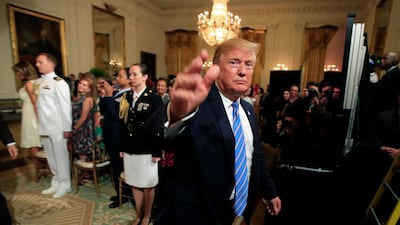Since the start of the Trump administration, I have been tracking in these pages a creeping process of American political deinstitutionalisation.
With the explosion of a series of bitter disputes between the White House and the Democratic-controlled House of Representatives this week, this alarming dynamic leapt out of the shadows of US governance and onto centre stage.
How the battle over Congress’s constitutionally mandated – but, for the president, extremely inconvenient – oversight authority proceeds will go far in determining whether the Trump administration succeeds in reshaping core political functions and expectations in the United States.
For more than 200 years, presidents have pushed back against congressional oversight. But all of them also recognised the legitimacy of that authority and the constitutional system of checks and balances, of which it is a cornerstone.
Until now.
This week, Mr Trump made it clear that the United States has a president who simply does not recognise, understand or care about the key balancing mechanisms in of the constitutional system, insofar as they interfere with his own interests.
He has asserted an unprecedented, blanket rejection of Congress's role as a check on the executive through oversight and investigation. And if his absolute refusal to co-operate or reveal vital information proves effective, the balancing mechanisms of the US political system will be smashed to pieces.
Given that the House is now in the hands of the Democrats and the Robert Mueller report has been released by the Justice Department in a redacted form, this fight is no longer avoidable.
Mr Trump says he will oppose every single lawful subpoena from House committees, without exception.
Attorney General William Barr has refused a House Judiciary Committee order to produce Mueller investigation documents under an almost certainly spurious claim of “executive privilege”. The Committee has voted to hold him in contempt.
Former White House counsel Don McGahn is, on the same sweeping grounds, refusing a subpoena to testify. Donald Trump Jr seems to be preparing to do the same.
Meanwhile, Treasury Secretary Stephen Mnuchin has flatly refused to obey a law that clearly requires him to release Mr Trump’s tax returns to the House Ways and Means Committee.
In short, Mr Trump’s administration is asserting the authority to refuse, unilaterally and absolutely, to co-operate with Congressional investigations and requests for information, dismissing them all as “presidential harassment”, no matter what the law and the Constitution, let alone American norms, dictate.
Democratic leaders in Congress have deemed this "a constitutional crisis”. Influential commentators on both the left and the right have argued that, if they really believe this, they should push forward with Congress's main weapon against a rogue president: impeachment.
But Democrats are clearly reticent to do that, because while impeachment in the House would be easy, a conviction in the Republican-held Senate is virtually impossible. Worse, the whole process would not only fail, it could easily prove a political godsend for Mr Trump, who will use his rhetoric of grievance to present it as another groundless “witch hunt” based on “fake news”.
That would leave Democrats relying on the courts to uphold congressional authority. However, there is a new, highly partisan five-vote Republican majority at the Supreme Court that, many fear, would be just as eager to serve Mr Trump as the Republican Senate is.
Only Chief Justice John Roberts – a lifelong republican but also a self-described defender of the court's integrity – might defect to preserve traditional checks and balances. But it's at least as likely that he will prove yet another GOP apparatchik. At this point, counting on a single person's institutional imperatives and integrity seems desperate and naive.
A meticulously sourced New York Times investigation has demonstrated that Mr Trump's carefully cultivated public persona, as a dynamic, highly successful, self-made real-estate billionaire in the 1980s and 1990s was an elaborate fiction.
In fact, he lost around $1 billion in less than a decade in terrible business deals, even though he received an equivalent of $413 million in today’s money from his father’s own real estate empire. Much of this cash, the report alleges, came Mr Trump’s way because he helped his father avoid paying taxes.
In response, Mr Trump characterised his suspect tax tactics as “sport”, which dovetails with his campaign pronouncement that not paying taxes merely “makes me smart”.
Yet, in Mr Trump’s hands, business after business has ended up in receivership, while he walks away, only to be salvaged by banks that are so deeply committed to him that they dare not abandon his debts, and so have bailed him out every time.
In his last debate against Hillary Clinton, Mr Trump told Americans he wanted to “run our country the way I’ve run my company”. Sadly, he seems to be doing precisely that.
The ultimate goal of deinstitutionalisation is the replacement of a country’s processes by an individual's will.
Turkey has just provided yet another excellent example of what that looks like, with the order to rerun the Istanbul municipal vote, simply because the result did not suit President Recep Tayyip Erdogan.
Faced with these challenges to legislative authority, the Democratic House lacks good options, not to mention crucial allies in the Senate and judiciary.
It seems clear that the last and best chance to stop the Trump administration’s historic challenge to core American democratic institutions will be at the ballot box in 2020.
Hussein Ibish is a senior resident scholar at the Arab Gulf States Institute in Washington


